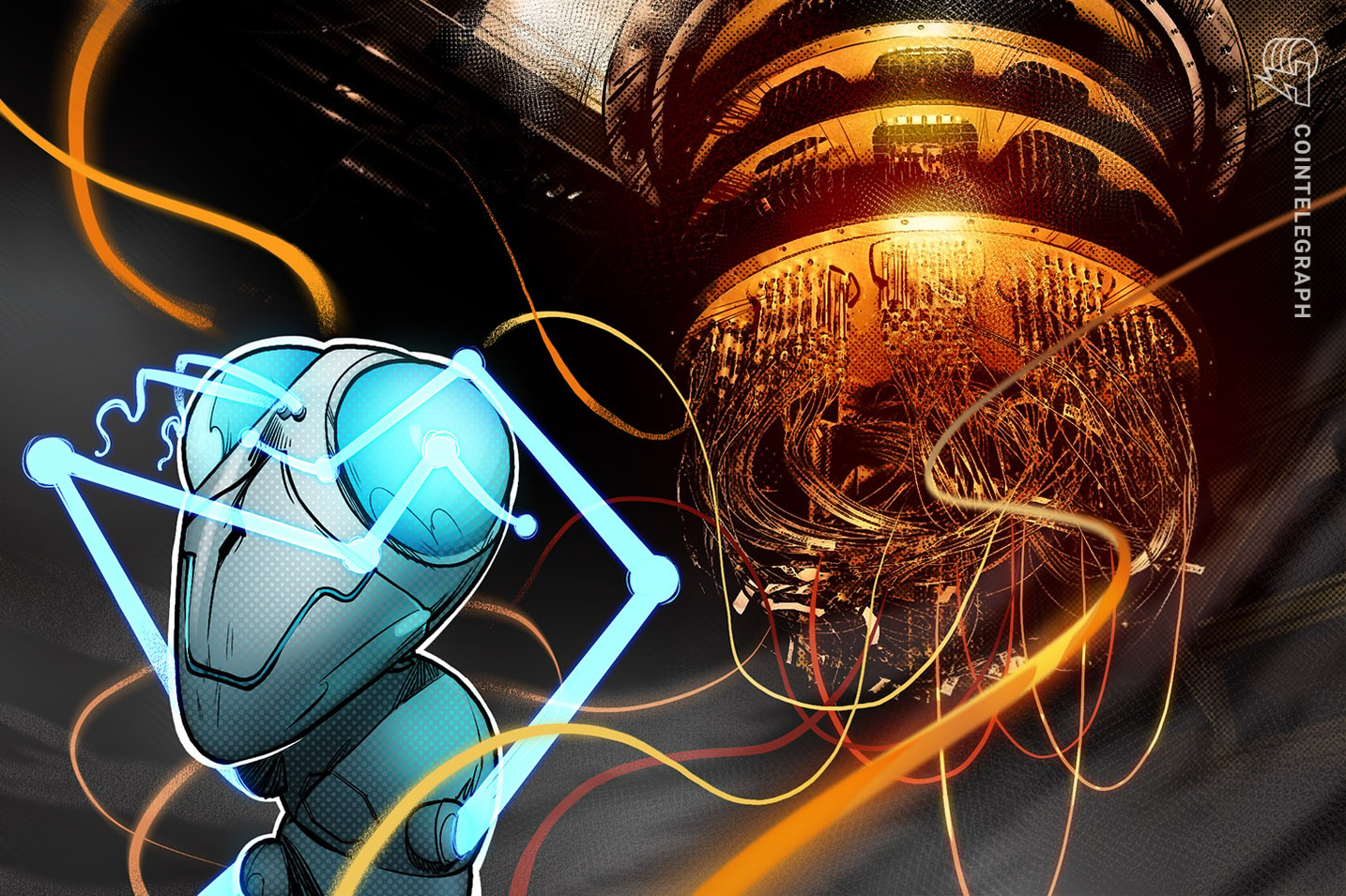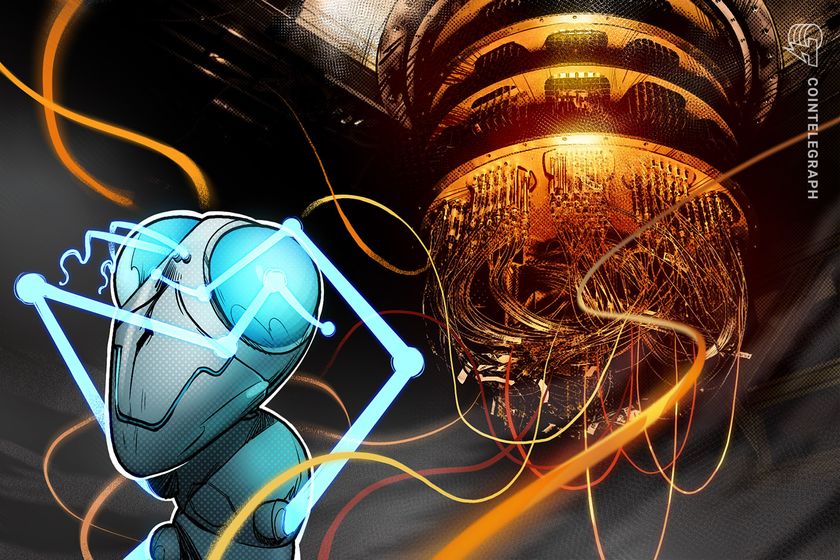Quantum computing is the next most significant disruptive technological leap and its rapid evolution and funding will soon make it a reality.

Analysis
Own this piece of crypto history
Quantum computing may seem like science fiction, but it may come sooner than expected.
On Jan. 11, 2024, the World Economic Forum identified artificial intelligence (AI) and quantum computing as emerging threats in a report exploring how quantum computing could threaten the existing tech landscape.
While computer scientists and developers agree that quantum computing will still take some years to develop, research in the field is very active.
In the public sector, all G7 countries are actively involved in quantum computing projects. In the private sector, seven of the top 10 tech companies are “either publicly competing for market dominance in involved in some capacity,” according to Quantum Resistant Ledger.
So when will quantum computing become potent enough to threaten contemporary cryptography systems, like those safeguarding cryptocurrencies?
According to a December 2023 report from Reuters, Tilo Kunz, executive vice president of cybersecurity firm Quantum Defen5e (QD5), told officials at the Defense Information Systems Agency that Q-day — the day quantum computing can break current security standards — could come as soon as 2025.
Major organizations in the finance world have noticed. In June 2023, the Bank for International Settlements started its “Project Leap,” which aims to develop quantum-proof payment systems with the Bank of France and Deutsche Bundesbank.
So, with ominous forecasts and central banks scrambling to safeguard payments, how can the blockchain and crypto industry prepare for Q-day? Is anyone prepared?
Why is quantum computing dangerous for blockchains?
David Chaum, a renowned computer scientist and founder of post-quantum resistant blockchain XX Network, explained to Cointelegraph how quantum computing can “vaporize” a blockchain.
Quantum computing could compromise the SHA-256 algorithm — the cryptographic hash function that serves as the primary wall of defense for securing access to blockchain-based assets like cryptocurrencies.
Subsequently, quantum computers could break the blockchain’s consensus by creating fake messages, which could jam the consensus protocol. Chaum said:
“Quantum computing could kill existing blockchains by forging the signatures of the nodes. You could take them down.”
They could also effortlessly crack private keys, making funds vulnerable to theft.
Vitalik Buterin’s proposal to defend Ethereum
Vitalik Buterin, co-founder of the Ethereum network, introduced a possible solution to blockchain’s quantum challenge.
On March 9, 2024, Buterin proposed a solution involving a hard fork, opening a debate on how to prepare the blockchain for a quantum emergency.
Buterin explained that quantum computers could crack an Ethereum account and reveal the private key by using the public key alone.
Recent: DeFi bull market confounds expectations with RWAs and ‘recursive airdrops’
As Buterin explained, the only Ethereum accounts safe from a quantum attack would be wallets that have never completed a transaction, as they wouldn’t have exposed their public key.
Of course, this is not a common practice among crypto holders, so nearly all wallets would be in jeopardy.
For Buterin, the technology required to make Ethereum immune to a quantum attack could be developed “tomorrow”:
“We are already well-positioned to make a pretty simple recovery fork to deal with such a situation.”
Buterin’s proposed solution is based on proving ownership of crypto assets or a wallet by applying a backup key as a fallback.
The concept was introduced in 2021 in the paper “W-OTS(+) up my Sleeve! A Hidden Secure Fallback for Cryptocurrency Wallets” by cryptographers Chaum, Mario Larangeira, Mario Yaksetig and William Carter, who proposed a key generation mechanism where users can generate a backup key, which is securely nested inside the secret key of a signature scheme.
In the event of a secret key leak, the backup key would generate proof of ownership and recuperate their funds in an updated quantum-resistant blockchain — essentially through a hard fork in the blockchain.
Therefore, if a quantum emergency emerges, users would download a new wallet software and prove their ownership with the fallback. Buterin mentioned how only a “few users would lose their funds” in this procedure.
The hypothetical hard fork would roll back the Ethereum network to the block where the large-scale theft occurred.
 An illustrated diagram of Buterin’s theoretical Ethereum Improvement Proposal. Source: Ethereum Research
An illustrated diagram of Buterin’s theoretical Ethereum Improvement Proposal. Source: Ethereum Research
The quantum solution’s effect on ETH price
Chaum claimed that Buterin’s solution isn’t perfect and could create some turbulence for Ethereum users.
As Chaum explained, if Ethereum does not implement a quantum resistance mechanism before a quantum attack, the emergency solution suggested by Buterin will force the chain to be reconstituted.
The cryptographer explained that a new chain with quantum-resistant measures built into its core would need to be built. Once that is achieved, the assets may be moved to a new wallet in the new chain.
During this process, the Ethereum blockchain would need to be paused for an unknown time until it’s restored to a new quantum-resistant blockchain. Chaum said that this procedure could take years.
He said that the consequences of the sudden halt of one of the most active blockchains should not be underestimated, stating that it could be catastrophic.
“There would be a big time gap. I’m not sure that the price of Ether would survive that gap.”
John Woods, chief technology officer at the Algorand Foundation, told Cointelegraph that, while he believes Buterin is “hyper-competent,” he feels Ethereum could take a step further: “It’s evident that this post represents an emergency plan of action and not an elegant transition into a post-quantum cryptography era for Ethereum.”
Recent: SEC targets Uniswap Labs, raising concerns over open-source code liability
Algorand implemented a post-quantum mechanism using “Falcon” signatures, one of the three signing algorithms the National Institute of Standards and Technology selected for standardization.
Woods encouraged Ethereum to adopt Falcon to foster interoperability as its implementation “is not limited to Algorand and holds potential for adoption by various other distributed ledger technologies, blockchains and related systems.”
Ethereum seems to have established an emergency protocol to survive if a quantum emergency is detected.
However, the emergency solution has serious caveats, which should make the Ethereum developer community focus firmly on developing quantum-resistant measures before Q-day arrives.



